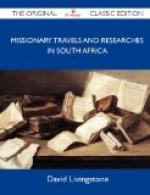* Several words in the African languages begin with the ringing sound heard in the end of the word “comING”. If the reader puts an ‘i’ to the beginning of the name of the lake, as Ingami, and then sounds the ‘i’ as little as possible, he will have the correct pronunciation. The Spanish n [ny] is employed to denote this sound, and Ngami is spelt nyami—naka means a tusk, nyaka a doctor. Every vowel is sounded in all native words, and the emphasis in pronunciation is put upon the penultimate.
Returning to Kuruman, in order to bring my luggage to our proposed settlement, I was followed by the news that the tribe of Bakwains, who had shown themselves so friendly toward me, had been driven from Lepelole by the Barolongs, so that my prospects for the time of forming a settlement there were at an end. One of those periodical outbreaks of war, which seem to have occurred from time immemorial, for the possession of cattle, had burst forth in the land, and had so changed the relations of the tribes to each other, that I was obliged to set out anew to look for a suitable locality for a mission station.
In going north again, a comet blazed on our sight, exciting the wonder of every tribe we visited. That of 1816 had been followed by an irruption of the Matebele, the most cruel enemies the Bechuanas ever knew, and this they thought might portend something as bad, or it might only foreshadow the death of some great chief. On this subject of comets I knew little more than they did themselves, but I had that confidence in a kind, overruling Providence, which makes such a difference between Christians and both the ancient and modern heathen.
As some of the Bamangwato people had accompanied me to Kuruman, I was obliged to restore them and their goods to their chief Sekomi. This made a journey to the residence of that chief again necessary, and, for the first time, I performed a distance of some hundred miles on ox-back.
Returning toward Kuruman, I selected the beautiful valley of Mabotsa (lat. 25d 14’ south, long. 26d 30’?) as the site of a missionary station, and thither I removed in 1843. Here an occurrence took place concerning which I have frequently been questioned in England, and which, but for the importunities of friends, I meant to have kept in store to tell my children when in my dotage. The Bakatla of the village Mabotsa were much troubled by lions, which leaped into the cattle-pens by night, and destroyed their cows. They even attacked the herds in open day. This was so unusual an occurrence that the people believed that they were bewitched—“given,” as they said, “into the power of the lions by a neighboring tribe.” They went once to attack the animals, but, being rather a cowardly people compared to Bechuanas in general on such occasions, they returned without killing any.




